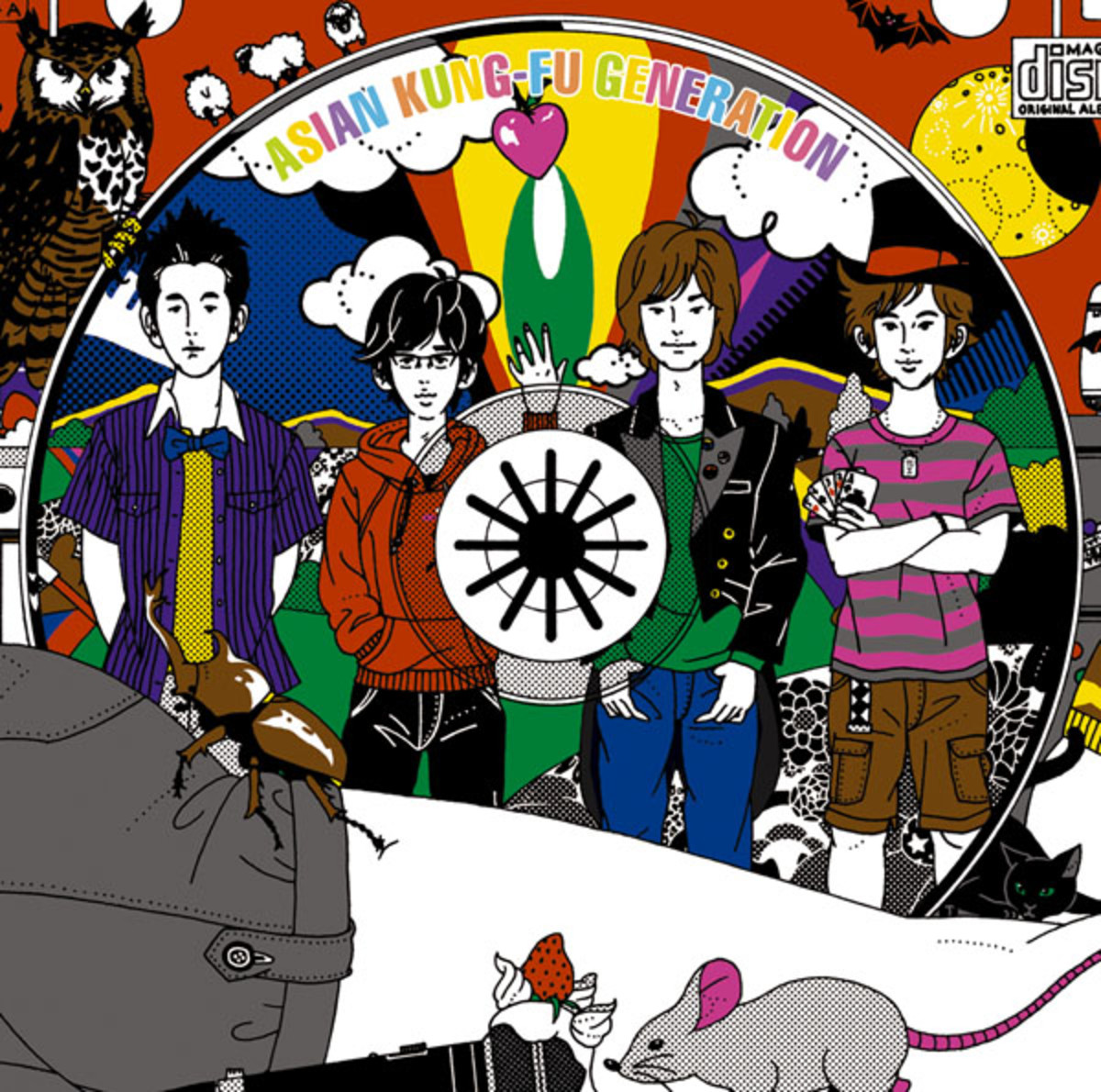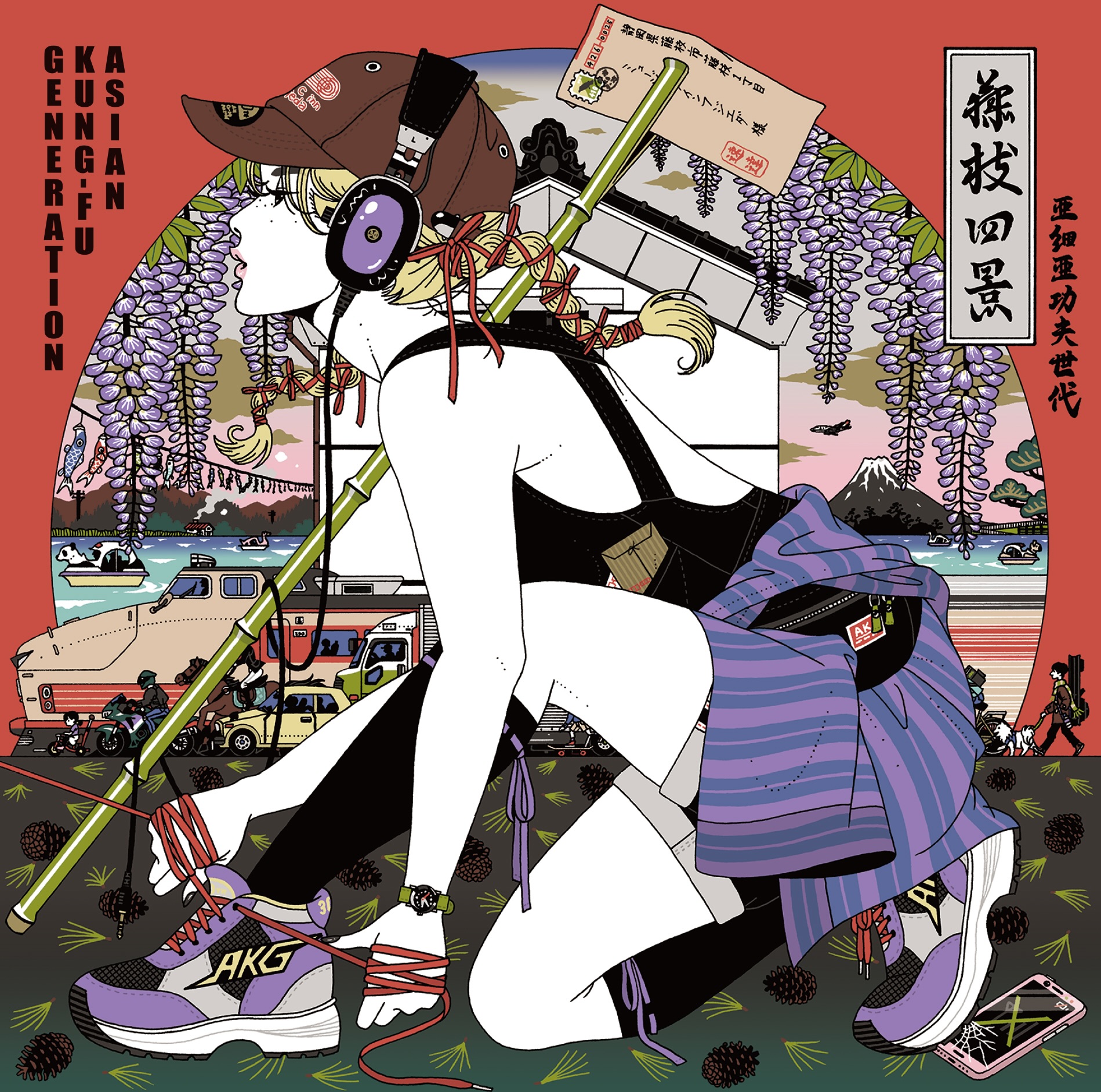Unlocking the Magic of ‘Magic Disk’ – Guest Article
30 July 2025 14:31 UTC+0

Author:
We are happy to announce that we are starting a practice of guest articles—from authors or fans who are not part of our team but still want to share their thoughts or some other things with the Asian Kung-Fu Generation fans community at large. For our first article of the sort welcome Kanra with their song-by-song take on the wonderful ‘Magic Disk’ in honour of the 15th anniversary of the album. Please follow Kanra on Twitter and read their blog about music with more wonderful articles on the topic.
If you wish to publish your article with us, please contact us via email or any social networks. NB: all thoughts in such articles are subjective and may not coincide with the akfgfragments’ team.
What does it mean to be a masterpiece? In the music world, many of the records that fall into the ‘masterpiece’ label are from a few different categories. Some helped start or come to define the genres they’re a part of, like ‘Paranoid’ or ‘Loveless’. Some are from rookie bands that knock it out of the park on the first try, like ‘Silent Alarm’ or ‘Is This It’. Or the bands behind them took a bold new genre direction, like ‘Kid A’. ‘Magic Disk’ by Japanese rock band Asian Kung-Fu Generation doesn’t neatly fit any of these preconceived narratives. It comes from a band on their sixth studio outing. There are some experiments on this record (more on that later), but on the whole, it’s not a complete overhaul of their sound. In fact, this can usually be the point in a storied band’s career where the wheels start to come off, the new sheens long past faded, and the band ends up playing to their usual audience. The press cycles around them begin to wear off, and they’re not gaining many new fans or even losing the ones they had from the start. Asian Kung-Fu Generation, or Ajikan as I’ll call them from here on in, managed to buck those trends with ‘Magic Disk’, releasing a fantastic work that not only outdoes everything they had worked on up to that point, but also proved to be a shining light of Japanese rock music in the 2010s.
Shinseiki no Love Song makes for the starkest album opener that Ajikan have pulled off. Kiyoshi Ichiji’s drums take centre stage right before Takahiro Yamada’s bassline sneaks in and Kensuke Kita’s mesmerising guitar loop in kind. Lead singer Masafumi Gotoh, or Gotch, uses a subdued sing-rap to talk about longing, regret and powerlessness in the face of monotonous days. No matter what happens, whether it be the death of someone important, two aeroplanes crashing into a building, or the dawn of a new century, nothing really seems to change. It’s as bleak sonically as it is musically, yet as it grows louder towards the end, Shinseiki no Love Song finds just enough hope in the idea of loving someone else to carry itself forward. While the rest of ‘Magic Disk’ never sounds as dark as Love Song, its themes of finding beauty and hope in the monotony and cruelty of everyday life are carried throughout.
Title track Magic Disk immediately follows, a wake-up call reminding listeners that yes, this is still Asian Kung-Fu Generation and they can still pump out power-pop bangers like nobody’s business. I love the echo on Gotch’s voice and the gurgling guitar lines strewn throughout. It also leads very well into the nosy Soushiyou, about a person who wants to get deep in their partner’s head and learn everything about them. They want to keep talking to this person no matter what, whether they’re truthful about their feelings or not. I love how Gotch stretches out his words here for a somewhat laid-back feel, and I adore the guitar solo that leads the song out.
Sayonara Lost Generation slows things down with a song ruminating about Japan’s Lost Generation. If you’re not tuned into Japanese history, the Lost Generation are the people who grew up towards the turn of the millennium, as the bubble economy of the 1980s burst and the youth of the 90s were left to pick up the pieces. An age of unstable employment and rising depression and suicide rates came in its wake. As the song smartly suggests, however, the turmoil of those Gen X’ers caught in the crossfire never truly settled. ‘Investors said, “This recession should bottom out.” We surely didn’t know where we’d be in 2010.’ The troubles of the 90s found their way into the global financial crisis of 2008, which still had ripple effects felt into the COVID pandemic, with the recession from that only worsening as the effects of America’s tariffs ripple across the world. Every generation is in deeper shit than the last, and every decade is called a ‘lost decade.’ ‘We have nothing. If that’s so, then so it is.’ But what Sayonara Lost Generation also posits is the idea of hope through connection. ‘These times that you complain about, let’s end it with us.’ The world may have left us with nothing, but the possibility of connecting with those around you means that better times and a better world are still possible, no matter how bleak today is. It’s a powerful message that will continue to resonate as the world seemingly only gets worse. Stick together. There’s power in that alone.
The next three tracks are, in my opinion, some of the finest work of the band’s entire career. Three very different songs that somehow blow me away every time I hear them. Most bands would kill for three songs in their entire career as good as these, let alone back to back on the same album.
Maigoinu to Ame no Beat was the opening theme to the absolute masterwork anime that is The Tatami Galaxy, a story about a man’s university adventures through falling in love and trying different clubs in the hopes of attaining the idyllic rose-coloured campus life he dreams of. Ajikan album cover artist Yusuke Nakamura did the character designs for the anime, and in a different timeline, I could totally imagine this show being given the FLCL treatment, designed as a long music video for Asian Kung-Fu Generation songs just as The Pillows’ iconic J-rock tunes fuelled FLCL. The song manages to be just as incredible as the anime it’s attached to. The speak-singing heard elsewhere on the album is in this too, and every time it shows up, I fall for it. I adore the bleak imagery set up in the verses, comparing ordinary people to mannequins, not being able to show true feelings until the day their bodies become one with the earth. It makes the message in the chorus about living every day in the chance that you’ll find someone who can uplift you all the more powerful. The song also lives and dies on a first for Ajikan’s catalogue, a brass section playing the main melody. There’s a cheery pep that the horns bring into this song that really takes this over the line into an incredible tune, making it all the sadder that live performances drop the horns and leave the song with a lot more empty space.
The woozy, quietly psychedelic guitars make Aozora to Kuroi Neko an absolute delight, especially when they get a chance to show off towards the end. This song uses wartime imagery of wounded soldiers calling out for help and beggars on the street trying to scrape by to connect to the record’s overarching theme of connection; no matter how distant or how quickly their life passes by. Gotch’s speak-singing before and after the final chorus almost gets too cheesy to pass the sniff test, but it’s delivered with enough passion and melodic tact to pull it off well.
Kakuu Seibutsu no Blues is Ajikan’s first serious attempt at outright J-pop in their discography. It’s a full-blown ballad, trading out the usual poppy guitar heroics for glistening pianos and an overwrought string section. The song is also ‘Magic Disk’ at its sappiest, comparing sexual embrace to melting into one soul. The whole melting into one consciousness thing feels very Evangelion when you read the lyrics on their own, but the band manages to sell you on the fantasy with its lush production. Every single time I hear it, I’m swept away. It’s a song that stirs the heartstrings and leaves me enchanted. It’s far from Ajikan’s usual playbook, yet I can’t help but be reminded of why I love this band every time it comes on. Ajikan are a much more multifaceted group than people give them credit for, being able to take sharp turns like this into heartwarming masterpieces thanks to Gotch’s pitch-perfect sense of both melody and captivating storytelling in his music. If you asked me what my favourite Asian Kung-Fu Generation song was on any given day, nine times out of ten, I’ll be reaching for this one.
Last Dance with the Sadness (Last Dance wa Kanashimi wo Nosete – ed.) is so blunt as a transitional song, transitioning the record away from a cloying ballad with a very upbeat, ‘classic’ Ajikan song. The placement also works very well lyrically, too; after several songs working through deep, strong sadness comes a song literally about dancing the night away to get your mind off things. Of course, the turmoil in the narrator’s heart isn’t settled by the end of the song, still being unable to confess to who they love, but they keep going at it anyway. Ichiji’s drumming, one of the hallmarks of Ajikan’s sound, really gets to play around here. The percussion is driving, the bongos and drums working in harmony to create the most danceable groove on ‘Magic Disk’. Last Dance also clearly marks ‘the deep cuts’ section of the album. At this point, none of the songs were released as singles, and most of them were phased out of setlists after touring for ‘Magic Disk’ wrapped up. Don’t be fooled by the lack of love given to these tunes, though, because it’s nothing but heaters from here on in.
Microphone is Ajikan’s first honest attempt at synth-pop, the shrill keyboards carrying a bright melodic edge to an otherwise still very upbeat and energetic number. While Microphone isn’t a sign of a new direction for the band, the simple electronic melodies foreshadow what Gotch would play around with to a much greater depth on his first solo record, ‘Can’t Be Forever Young’. The stripped-down, mellowed-out folk-rock of Rising Sun is yet another surprise thrown in, but it works just as well as the other pivots on ‘Magic Disk’ thanks to its driving percussion and playfully gloomy talk-sing from Gotch. His delivery on the fourth verse is especially addictive. The closing pair of the record acts as a return to form, as both Yes and Daidai are the melodic, imaginative power-pop that the band has made their name on up to this point. Despite the lack of tricks, they’re both highly catchy tracks that manage to wrap up the themes of connection and determination in even the most hopeless and dreary of days into a nice bow. It’s a comforting end to a wonderful record that, on its own, stands out brightly in Asian Kung-Fu Generation’s incredible discography. I actually cannot think of a better way to wrap things up! ‘Magic Disk’, a beautiful album, classic in its genre, perfect in every way.
…If you’re reading this on akfgragments, you know something’s missing. I know something’s missing. Magic Disk’s core tracklist wraps up at Daidai, but one more song sneaks in at the end as a bonus track. Solanin marks another first for Ajikan, being the first song Gotch had no involvement in the lyrics of. That job was left to manga artist Inio Asano because this song was a tie-in for the 2010 live-action adaptation of Asano’s manga Solanin, which came out two months before the release of ‘Magic Disk’. It’s about a directionless college graduate named Meiko and her decision to quit her job and join her boyfriend in reviving his old college band. This is a heartbreaking coming-of-age tale of tragedy, ennui, and finding purpose. It’s also one of the greatest manga I’ve ever read, and to my delight, the film lived up to the sky-high expectations placed by the source material. It’s as crushing and lovely as the book in every single way. And yet so much of my attachment to the film, as fantastic as it is, is to Solanin the song.
The song works on three levels. Asano understood Gotch’s style of poetry so well that he was able to write something for the band to sing without it feeling inauthentic to their character. The song also perfectly encapsulates all of Meiko’s feelings throughout the story and is performed with such tenacity, passion and soul that every piece of the song shines through. It’s one of the saddest songs in Ajikan’s discography, a song about saying goodbye to someone you love, no matter how hard it is. It’s a song that tries to put on a brave face, and the last verses could be interpreted as a voice of confidence that this is the right path to take. But on the inside, nothing tears at them more. Every can of coffee and piece of clothing left behind reminds the narrator of who they left behind. They try their best, but they can never truly let go.
Solanin had a very interesting afterlife. What very easily could’ve been a flash in the pan tie-in for a movie managed to arguably become Asian Kung-Fu Generation’s biggest song inside Japan. It’s wormed its way into many a karaoke session, the best sign of a lasting J-pop staple. The band also feels very warmly about the response to Solanin, as it’s become a permanent live staple for them since its release. During festival appearances, Solanin is oftentimes the only song from ‘Magic Disk’ that will show up on setlists. The impact has been undeniable, yet more than earned. On an album loaded front to back with masterpieces, Solanin still found a way to be one of a kind.
Something I often think of whenever I listen to ‘Magic Disk’ is how the fans were receptive to it. After all, it’s the first full-length to come out of what was a packed 2008 for the band, between oft-forgotten EP ‘Mada Minu Ashita ni’, acclaimed ‘World World World’ and adventurous concept record ‘Surf Bungaku Kamakura’ to cap the year off. Full disclosure here, but I am not a Japanese speaker, nor was I active in the fandom 15 years ago when ‘Magic Disk’ would’ve been at its most relevant. The vibe I get from scant impressions from mainly English-speaking fans is that this album was a turning point for the worse. After ‘World World World’, this is the band losing their way, with everything coming afterwards getting a somewhat rockier reception. It’s the band getting old and losing the energy that made people come to them in the first place. This makes me sad. In my personal opinion, ‘Magic Disk’ is a great culmination of everything the band had been doing up to this point. Ajikan traded just a little bit of their youthful energy on past albums for a much more expansive sound palette. Even then, tracks like Magic Disk and Yes prove that they still write urgent, powerful rock anthems in the process. One of the band’s most compelling selling points were their poignant lyricism and storytelling, and ‘Magic Disk’ keeps well with tradition while waving in more open pieces of political commentary without missing the landing. Albums like ‘Sol-Fa’ have become beloved relics of J-rock, even beyond their home country, for very good reasons. ‘Magic Disk’, even with one of Asian Kung-Fu Generation’s most defining songs, isn’t considered that. All I can do is hope that eventually, as the spread of Japanese music reaches new heights across the globe, new listeners looking back will be able to uncover ‘Magic Disk’ as the buried treasure it’s been all along.
Follow us on Instagram, Twitter, Telegram and Facebook to get news notifications, and join our Discord server for a friendly discussion. And support us on Ko-fi if you have a chance.

